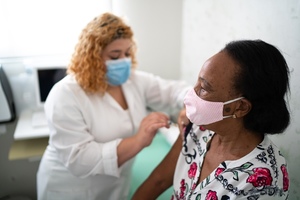COVID-19 vaccines: further evidence of success
New evidence continues to show vaccination is highly effective in protecting against death and hospitalisation from coronavirus (COVID-19).

New Public Health England (PHE) analysis shows for the first time that individuals who receive a single dose of the AstraZeneca vaccine have approximately 80% lower risk of death with COVID-19 compared with unvaccinated individuals.
The report also shows protection against death from the Pfizer-BioNTech vaccine rises from approximately 80% after one dose to 97% after 2 doses.
Separate new PHE analysis also confirms the Pfizer-BioNTech vaccine is highly effective in reducing the risk of hospitalisation, especially in older ages.
In one paper published today, PHE looked at the number of new symptomatic polymerase chain reaction (PCR) positive cases between December and April, and those who subsequently died within 28 days of their positive test and compared them according to vaccination status.
This showed that COVID-19 cases vaccinated with a single dose of either the Pfizer-BioNTech or the AstraZeneca vaccines had similar levels of protection against mortality after a single dose, at 44% and 55% respectively, compared with unvaccinated cases.
Combined with the protection vaccines offer against becoming a case in the first place, this is equivalent to approximately 80% protection against mortality in individuals vaccinated with a single dose of either vaccine.
For the first time, the latest analysis includes protection against mortality from the AstraZeneca vaccine, and additional protection from 2 doses of the Pfizer-BioNTech vaccine.
The data shows that protection against mortality from the Pfizer-BioNTech vaccine is even higher – around 69% – for confirmed cases who had their second dose at least 7 days prior to their positive test.
When combined with the estimated protection against becoming a case, this is equivalent to an estimated 97% protection against mortality in individuals vaccinated with 2 doses of the Pfizer-BioNTech vaccine.
A separate new PHE report also shows further evidence that the vaccine is highly effective in reducing the risk of hospitalisation, especially in older ages.
For the over 80s, it is estimated that 2 doses of the Pfizer-BioNTech vaccine reduces the risk of hospitalisation by 93%.
The findings highlight the importance of people completing their vaccination course.
Health and Social Care Secretary Matt Hancock said:
The evidence is clear that vaccines provide significant layers of protection against this awful disease. People across the country can breathe a sigh of relief knowing that their risk of becoming seriously ill or hospitalised with the virus is significantly reduced after being vaccinated.
This news will be life-changing for many people who have worried about the devastating impact of this virus, either to themselves or a loved one.
The vaccine is saving thousands of lives and giving us hope on our road to recovery. When the time comes to get your jab, please join the tens of millions of people who are now benefitting from this vital protection.
Dr Mary Ramsay, Head of Immunisation at PHE, said:
The vaccines are saving lives every day. This analysis gives us even more reassurance that the vaccine is highly effective in protecting adults against death and hospitalisation from COVID-19.
Getting your vaccine will significantly reduce your risk of dying or becoming seriously ill from COVID-19. It will also significantly reduce your chances of getting infected and infecting others. It is vital to get both doses of your vaccine when you are offered it.
Minister for COVID-19 Vaccine Deployment Nadhim Zahawi said:
Vaccines have been one of the biggest medical marvels in history and the data published today proves how valuable they are in keeping people safe.
It’s fantastic to see this real-world data and the impact both vaccines are having on protecting the public and the NHS.
I urge all those invited to step up and book in your jab, and play a part in our journey out of the pandemic and back to normality.
The vast majority of confirmed COVID-19 case data analysed in these reports are expected to be the B.1.1.7 (Kent) variant. For most of the other variants of concern, there is not yet sufficient numbers of confirmed cases with follow up to generate separate estimates of vaccine efficacy.